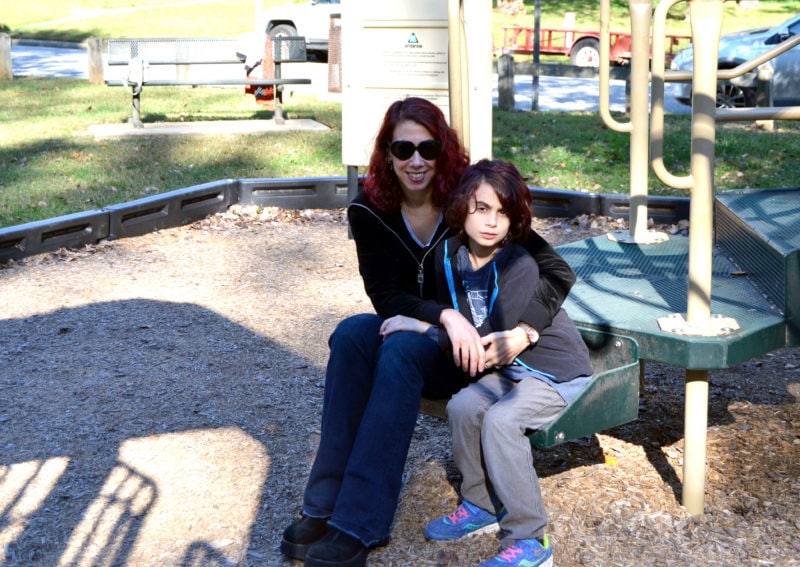By Guest Blogger Hillary Zaken
“Once upon a time, there was a mythical man named Jewa Claus. Jewa Claus helped the Jewish children celebrate Hanukkah by bringing light and celebration and gifts into their home, by teaching Jewish children to be proud of who they are, and by helping non-Jewish children understand the Hanukkah story, and how Hanukkah is not the Jewish Christmas.”
This is a story my older son, now in second grade, told me last year. He was responding to what many call the December dilemma, that struggle that non-Christian Americans have around the winter holiday season.
Storytelling is an important Jewish tradition. We constantly reinterpret the stories in the Bible, and in our tradition, so they are relevant for the modern day. And what is more relevant to a Jewish boy growing up in North Carolina than a story to explain why Hanukkah is important, different than Christmas, yet relatable in some way to the ever-present Christmas decorations, music, and lights?
 Hanukkah celebrates the value of religious freedom. It commemorates the victory of the small over the mighty, the light in the darkness, the continuity of a people. And for a Jewish boy in North Carolina, where Christmas is everywhere, making Hanukkah stand out is paramount.
Hanukkah celebrates the value of religious freedom. It commemorates the victory of the small over the mighty, the light in the darkness, the continuity of a people. And for a Jewish boy in North Carolina, where Christmas is everywhere, making Hanukkah stand out is paramount.
After all, it is the generations of storytelling that ensures the preservation of our traditions. Especially when we are a minority population, an island of blue and white in a sea of red and green.
After all, how do we know the Hanukkah story, the tale of Jewish Maccabee warriors of old, who defeated the mighty Greeks while defending their own freedom of religion? How do we know the story of the miracle of the oil, the one small portion that gave light for eight long days? Why do we eat latkes, or jelly donuts (sufganiyot), or other fried treats, to celebrate the miracle of the oil that shone so brightly to bring the Jewish people out of the dark era of religious persecution?
It is not because we all sit around together and read the Book of Maccabees, and it is not because Hanukkah is a strictly religious holiday with many explicit rules to follow. It’s because of storytelling, of course. Traditions, passed down through the generations, are adapted to give meaning today.
We light a nine-branched candelabrum, called a Hanukkah menorah or Hanukkiah, which resembles the one in the ancient Temple in Jerusalem (although that one had seven branches). We eat fried donuts – a treat enjoyed by Moroccans and Algerians for centuries. We sing a song, Rock of Ages, or Maoz Tzur, which was written in 12th century Europe. We play a gambling game with a 4-sided top, the dreidel, which was adapted from a German gambling game. And finally, the way we celebrate Hanukkah in America – with fried potato pancakes, gifts for eight nights, and vast cultural importance – only started in the early 20th century!
It is all because of storytelling, of course. Stories that teach us to respect other religious traditions, to shine a light in the darkness, to come together as families, and to always, always, proudly be who we are.
Perhaps you too should tell a story. Create a tale that explains what is going on in the world today, including the changes afoot, to your children. Weave a narrative that makes history, those events that happened in the distant past, relatable and important. Tell a story that helps your family celebrate its unique culture, religion, and traditions.
Just like the story of Jewa Claus, the mythical Jewish hero my son invented.

















Love it! As a Christian celebrating the biblical feasts, we enjoy the story of Hannukah over the fairy tales of Christmas. Celebrating with our Jewish and Messianic friends always teaches me something more about the rich culture of Jesus. We light the hannukiah and celebrate all 8 days of blue and white alongside you! Happy Hannukah!
Beautifully written! Wishing your family a beautiful Hannukah season!